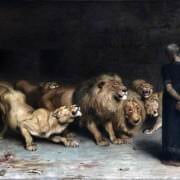Second to Revelation, Daniel stands out as the most difficult book in the Bible to understand. Well, only the second half of it. The first half is some of the easiest and most loved narrative for children’s stories and Bible studies.
Daniel is a standout statesman in Babylon. He lives to over ninety years of age maintaining a high rank under Nebuchadnezzar, Belshazzar, Darius and Cyrus. He was taken to Babylon in the first invasion by Nebuchadnezzar and was joined by Ezekiel who arrived in the second invasion eight years later. Ezekiel refers to Daniel as a model of righteousness, no small feat while spending sixty-nine years in the most vile of courts. Daniel always remained faithful to God.
The overarching theme of the book is God’s kingship and royal power. Depending on your viewpoint each chapter tells us about God and Daniel’s experiences living in pagan ruled kingdoms.
Chapter 1 – God is shown as the keeper as Daniel tells us his story of what it’s like to live under Babylonian (pagan) authority.
Chapter 2 – God is shown as the God of history as Daniel speaks about Babylon being the first of three empires to rule Jerusalem and in the time of the fourth, God would usher in a kingdom that would rule over all.
Chapter 3 – God the deliverer is seen as Daniel and his friends survive under Babylonian rule.
Chapter 4 – God is shown as all powerful as Nebuchadnezzar suddenly dies.
Chapter 5 – God is also the judge when in the space of a chapter the Babylonian kingdom falls and the Persians rule.
Chapter 6 – the God who can do anything when under Persian rule saves Daniel from the infamous den of lions.
Chapters 7-12 take up the theme of how God’s kingdom relates to the kingdoms of the world. God’s kingdom moves forward no matter what goes on around it.
Daniel tells us two certain things: (1) it is more than possible for a follower of God to stand in the midst of pagan rule and pressure, and (2) God’s kingdom reigns over all the kingdoms of the world, no matter how it looks at the time.
Pic: Daniel in the Lion’s Den by Briton Riviere (1872).


